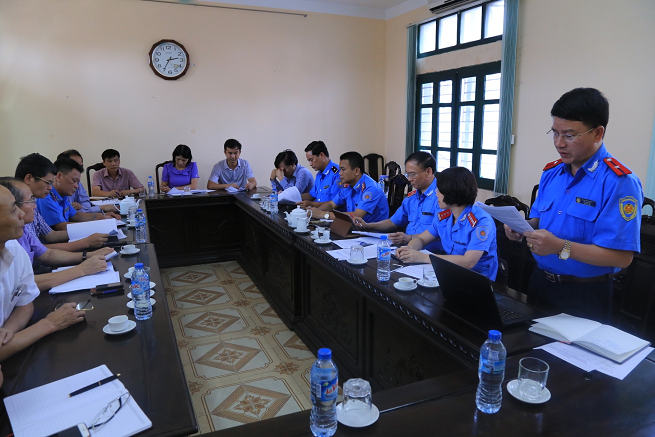Recruitment is an urgent and mandatory requirement in the management and utilization of officials and public employees. To build a team of officials and public employees that meet the demands and tasks in the new situation, the role of recruitment work and the agencies involved in recruitment is very important.
In recent times, the Government of Vietnam has enacted numerous regulatory documents to guide the implementation of the Law on Cadres and Civil Servants, official 2008 and the Law on Public Employees, 2010 to concretize the provisions of these laws. Notably, this includes Decree 29/2012/ND-CP dated April 12, 2012, issued by the Government of Vietnam on the recruitment, use, and management of public employees, and Decree 24/2010/ND-CP dated March 15, 2010, on the recruitment, use, and management of officials. However, during the implementation of these Decrees and related documents, some issues have arisen that require guidance and amendments from competent authorities to align with current practices, particularly in the context of application procedures for recruitment without competitive examinations for officials and public employees.
First, the application of Decree No. 29/2012/ND-CP, Decree No. 24/2010/ND-CP is hindered by the provisions of Decree No. 158/2007/ND-CP dated October 27, 2007, issued by the Government of Vietnam prescribing the list of posts and the term for periodic post rotation for officials and public employees, and Decree No. 150/2013/ND-CP amending and supplementing several articles of Decree No. 158/2007/ND-CP. As per Point a, Clause 1, Article 14 of Decree No. 29/2012/ND-CP on special recruitment consideration for public employees, an individual with three or more years of work experience in the required sector or field will qualify for the position needing recruitment. However, Decree No. 158/2007/ND-CP (as amended and supplemented) stipulates the term for job rotation to be three years (full 36 months) for officials and public employees specialized in finance, state property management, directly handling and resolving work involving agencies, organizations, units, and individuals. Therefore, a public employee who has worked in a position subject to mandatory rotation for three years cannot be considered for special recruitment under Point a, Clause 1, Article 14 of Decree No. 29/2012/ND-CP as they will have to change positions and thus fail to meet the required industry experience.
Similarly, Point c, Clause 1, Article 19 of Decree No. 24/2010/ND-CP outlines that individuals with university-level education or higher and five or more years of work experience in the sector or field requiring recruitment may qualify for direct recruitment without examination. As previously analyzed, an official, who must undertake duties listed for periodic job rotation, will be unable to meet the five-year experience requirement before being rotated to a new position and thus cannot be considered for recruitment without competitive examinations (as after three years, they would have been rotated). These regulatory requirements present practical issues and limit the practical rights of certain professionals such as accountants and inspectors.
Accordingly, it is recommended that competent authorities swiftly review and amend relevant regulations to provide "carry-forward" and "preservation" of the duration officials and public employees have served in positions before job rotation, serving as a basis for recruitment consideration without competitive examination. This ensures fairness and aligned policies during recruitment. Moreover, competent authorities should stipulate that recruitment without competitive examinations should only apply in cases where sectors or localities fail to organize competitive examinations for three years or more. This enforcement would rationalize the process and mitigate unnecessary limitations in recruitment practices.
Second, the application of Decree 29/2012/ND-CP, Decree 24/2010/ND-CP may create "regionalism" in the recruitment of officials and public employees. As mentioned, an official or public employee must meet the experience requirement of "three years at a position for public employees" and "five years at a position for officials." According to the decrees' spirit, recruitment should be based on duty requirements, job positions, and staffing quotas. Agencies using officials and public employees are responsible for identifying and describing job positions, reporting to management authorities for approval as a basis for recruitment. Thus, the annual recruitment needs of officials and public employees depend on the "subjective will" of the employing agencies. The question here is, if employing agencies do not develop annual recruitment plans to present to competent authorities for recruitment (while staffing quotas remain and labor contract policies apply to some cases), how will this be addressed?
Under current regulations, this issue depends on the employing agencies of officials and public employees. This aligns with the rules for financial and staffing autonomy in carrying out assigned tasks. Consequently, employing agencies might "wait" for those under employment contracts to meet the three-year or five-year requirements before requesting competent authorities to consider direct recruitment without competitive examinations for these cases. This real-world issue affects the competitiveness and opportunities for recruitment, particularly for recent graduates and those not yet meeting experience requirements. Hence, new graduates have limited and difficult chances to work in state agencies. Competent authorities should urgently address and provide specific guidance on this matter. Appropriate mechanisms and sanctions should be established to limit "regionalism" in recruitment. Agencies should be mandated to register recruitment needs if staffing quotas exist; failure to do so should result in a reduction of quotas and reassignment to other agencies. This would mitigate recruitment issues, ensure transparency, and open opportunities for new graduates.
Nguyen Xuan Vien
Department of Justice, Kon Tum Province
 Article table of contents
Article table of contents
![[InfoGraphic] 6 forms of discipline for officials and public employees under Decree 71/2016/ND-CP](https://cdn.lawnet.vn//uploads/NewsThumbnail/2016/07/12/1319291-01.png)




.Medium.png)
.Medium.png)
.Medium.png)
.Medium.png)
